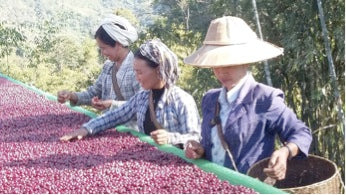Your Cart is Empty
FREE SHIPPING ON ALL ORDERS OVER $50
FREE SHIPPING ON ALL ORDERS OVER $50
FREE SHIPPING ON ALL ORDERS OVER $50
June 11, 2022 3 min read 1 Comment
**ORIGINALLY POSTED / WRITTEN IN SEPT 2016 - September 2016 marks a historic time for specialty coffee, with the arrival of one of the most highly anticipated coffees of the year. A coffee as vibrant and beautiful as the culture, tradition and people who produced it, a coffee from Myanmar! We are extremely excited and honored to be among a handful of coffee companies across the United States to take part in this coffees landmark arrival to the United States specialty coffee scene.

(Image Provided Courtesy of: Craig Holt, Atlas Coffee Importers)
Myanmar formerly known as Burma, has served as a major trade route between India and China dating back as far as 100 BCE. The vast majority of the commerce was thought to be in agricultural production and export. However, Burmese exports extend far beyond agriculture; ranging from gems to oil. In fact, Myanmar became the primary producer/ exporter of the prized log Teak wood during the 1700-1800's. Teak was highly sought after throughout European countries at the time for use in ship building, due to it's strength and superior durability to other woods. Coffee was first introduced to Myanmar in 1824 by the British, after they seized and occupied the region.
The British occupation ended in 1948. Since then, for more than a half a century, the people and culture of Myanmar have been ruled by oppressive military dictatorship, extreme poverty and the proliferation of the illicit drug trade. Textile and clothing manufacturing industries through out the region compounded issues of extreme destitution. Human trafficking and unimaginable human rights violations were common place. Part of what is colloquially referred to as Asia's "Golden Triangle" consisting of an area overlapping the mountainous regions of Myanmar, Laos & Thailand, was at one time the producer of 25% of the worlds illicit opium used for the production of Heroin and reported to be the second largest Opium producer worldwide behind Afghanistan. Opium poppy crops fetch a far higher premium on the black market than that of rice and other agricultural crops. Unfortunately, this drove many farmers and households to focus their efforts on the cultivation of poppies to support their families & livelihoods.
In April of this year the first civilian was elected to presidency, ending nearly six decades of military dictatorship. Beginning a new era for the people and economy of Myanmar. The implementation of a democratic rule for Myanmar is a long road paved with many obstacles to be sure, but is an exciting indicator of positive and progressive social and economic changes for the future of the country.
As Myanmar continues to develop democracy. Many countries including the United States are beginning to cultivate economic relationships that could help to strengthen Myanmar. The United States Agency for International Development (USAID) has been involved in creating economic opportunities for ethnic minority groups through out Myanmar. There has become strong governmental interest in cultivating coffee, rather than opium poppies as it grows in the same regions, and offers a viable economic alternative to the illicit drug trade.

(Image Provided Courtesy of: Craig Holt, Atlas Coffee Importers)
The Coffee Quality Institute (CQI) in conjunction with USAID, Winrock International and Atlas Coffee Importers have been on the ground working with the Myanmar Coffee Growers Association (MCG) a cooperative of twenty five growers and exporters based in Mandalay. Supporting the development of coffee quality standards, growing and harvesting protocols, pre/ post processing and milling techniques critical to the growth and success of this emerging coffee origin.

(Image Provided Courtesy of: Craig Holt, Atlas Coffee Importers)
This year, we are excited to be releasing two lots from different farming groups. Both will be available for pre-sale starting Monday September, 5th 2016 and we will begin roasting and shipping Friday September 9th, 2016. For all the details and to order please click here!
We are extremely excited about this coffee, and the hard work of all of the groups involved in making this coffee a reality! We will be donating a portion of the sales generated by this coffee directly back to the Myanmar Coffee Growers Association, in a effort to help foster the continued development of this incredibly inspiring community and exceptional coffee.

Coffee farmers in Mya Ze Di (Image Provided Courtesy of: Craig Holt, Atlas Coffee Importers)
Written By: Tamas Christman, Founder / CEO, Q-Grader - Dragonfly Coffee Roasters
Sign up to get the latest on sales, new releases and more …

Tracy Ane Brooks
September 09, 2016
Awesome Article! Good history to know and excited for the future of this country.